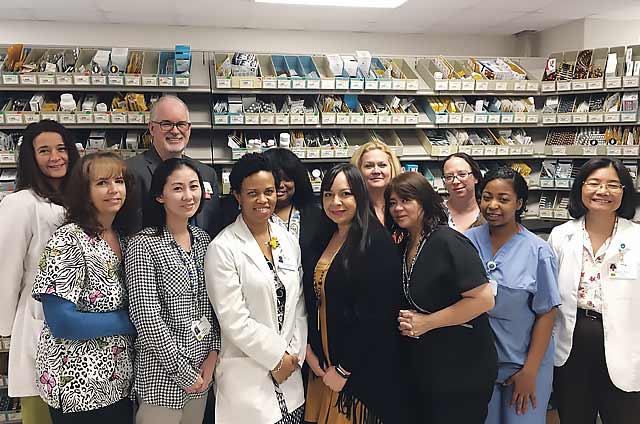Karla Perez (second from left), Regional Vice President of The Valley Health System, gathers with members of Summerlin Hospital’s acute rehabilitation team.
How do you define quality healthcare? For a patient undergoing a hip replacement, it may mean a successful surgery, assistance with pain medication and personal needs, and time spent with a physical therapist to begin walking and learning useful tips for getting out of bed or using the bathroom.
However, behind the scenes, the healthcare team is actively following evidence-based “best practices” before, during and after surgery. This may include administering an antibiotic at a specific time before surgery and placing compression stockings on the legs; assessing a patient for blood clots or signs of infection; and reviewing medications to reduce the risk of falling. Collectively, these actions can result in decreased hospital readmissions related to major joint surgery.
“We are constantly looking for ways to improve the care we provide,” says Cindy Dickerson, System Director of Quality for The Valley Health System. “We define quality as working to achieve specific outcomes by using proven, evidence-based processes.”
Quality initiatives in The Valley Health System
For The Valley Health System, quality initiatives fall into specific categories: patient safety; patient experience; core measures for patients with specific health conditions; infection control; high-reliability unit and lean projects; and recognition awards, certifications and accreditations.
“Our hospitals have made tremendous strides in patient care over the past decade,” says Karla Perez, Regional Vice President. “Ten years ago, Valley Hospital was the first in The Valley Health System to become a primary stroke center. Today, most of our hospitals* are certified as advanced primary stroke centers by The Joint Commission and have earned multiple awards from the American Stroke Association for the care we provide. Our stroke coordinators have made significant efforts to educate our community about the signs and symptoms of possible stroke so people call 9-1-1 and go to the emergency department immediately. The time factor plays a key role in whether patients can receive a clot-busting drug that can help reduce lingering effects or disability.”
To further enhance a stroke patient’s recovery, Summerlin Hospital’s acute rehabilitation unit recently earned The Joint Commission’s Gold Seal of Approval® for Stroke Rehabilitation.
“Quality initiatives are a constant presence throughout our hospitals,” says Perez. “Through the hard work of our employees and medical staff, we’ve positively impacted thousands of lives, and we’ll continue to do so every day.”
Learn more about our awards and accreditations >


